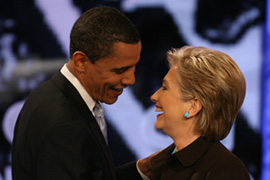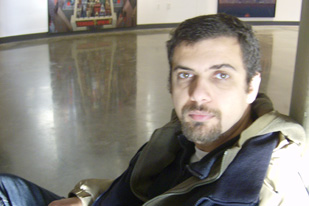In my view: Iraqi blogger
Why one disillusioned Iraqi feels the US political system needs a “third way”.

|
|
As part of Al Jazeera’s coverage of the”Super Tuesday” polls, Iraqi blogger Raed Jarrar, who writes the Raed in the Middle weblog and now lives in the US, explains his thoughts on the US political process and why it is in dire need of an overhaul.
When I first immigrated to the US in 2005, I was interested in foreign policy issues and spent most of my time working to end the occupation of Iraq and stop the blind support and unlimited aid to Israel.
Then I had a life-changing incident in 2006, when I was stopped at an airport in New York and prevented from boarding to my airplane because my T-shirt had the words “we will not be silent” in both Arabic and English printed on it.
A TSA [transportation security officer] told me that coming to a US airport with Arabic words on my T-shirt was equivalent to visiting a bank while wearing a shirt that read “I’m a robber”.
After making me cover my shirt, the officers changed my seat from the front to the back of the airplane.
A new fight
|
I came to realise that the same government that had bombed my neighborhood and destroyed my freedom in Baghdad was now attacking my freedom in New York city |
This incident opened my eyes and led me to learn more about the long history of racial discrimination and about the shrinking space for individual freedom in the US.
I came to realise that the same government that had bombed my neighbourhood and destroyed my freedom in Baghdad was now attacking my freedom in New York City.
It was now my personal responsibility to fight, both for my constitutional rights and to end the illegal US intervention in Iraq.
While I cannot vote – because I am not a US citizen – I can still support the candidates financially and volunteer to help their campaigns.
Therefore, I searched carefully for a presidential candidate who would bring all troops out of Iraq, end the US intervention in the Middle East and the rest of the world and restore individual rights to protect me and everyone else who lives in the US.
An ‘open’ system?
The first thing that drew my attention while following the primaries was the number of interviews with supposedly “ordinary” citizens who were running to win the nomination for one of the two ruling parties.
|
External link |
Interviews with the candidates were used by the mainstream media as a joke and invested by the establishment to maintain the “open political system” image.
But studying the record of the US elections’ system suggests a different picture.
While polls indicate that around 80 per cent of the US population disapproves of the work of the federal congress, more than nine out of 10 DC officials get re-elected every general election.
In 2006, 94 per cent of house incumbents also won re-election and in 2004 they had a better than 99 per cent success rate.
Debating the debates
I learned a lot of other new things about the US political system during the last two years and, the more I learn about this system, the more I realised how closed and exclusive it is.
| In focus |
For example, millions of US tax payers – including myself – spend long hours watching the presidential candidates’ debates.
We then watch yet more hours of media pundits debating the debates, then spend even more hours with friends and colleagues debating the media debates on the debates!
But not everyone knows that the US presidential debates are administrated by a corporation called the Commission on Presidential Candidates, which is led by former leaders from the two ruling parties.
And they make sure no third party candidates can ever be admitted to use their megaphone.
They even try their best to exclude Republicans and Democrats who are not parroting the establishment’s line.
But even after understanding these and other unfair limitations, I still followed the primaries’ debates hoping to find decent candidate.
The ‘least evil’ candidate
 |
| Candidates “fight over different tactics for the same strategy”, Raed says [AFP] |
After a few weeks I almost fell in the trap of accepting the “least evil” and “most electable” instead of searching for someone who I agree with, but after more consideration I decided that the “least evil” is not good enough for me.
Although I am not sure what “mainstream” and “electable” exactly mean, I don’t think I’m ready to compromise and support a candidate just because he or she fits such categories.
As it stands now, all the “frontrunners” or “mainstream” and “electable” candidates from the two ruling parties have exactly the same interventionist foreign policy and different versions of horrible domestic policies.
They fight over different tactics of the same strategy. Some of them want to stay in Iraq to “kill the bad guys”, and others want to stay there to “save Iraqis from themselves”.
There is not even minor discussion about restoring the US’s deteriorating individual freedoms.
A third way
Unfortunately, the 2008 presidential elections will not bring anything new to US foreign or domestic policy.
|
third party can have a foothold that might be the space for a political revolution to take place, one day in the future |
We will see a continuation of the old strategies, with some minor differences in marketing them.
Someone like me who was in Baghdad while the first Bush, then Clinton, then the second Bush dropped bombs on our neighborhoods realises that there is not a “dime’s worth of difference” between the two ruling parties and their one foreign policy.
But in the middle of my frustration, the last few weeks gave me hope that a better future is still possible – should a third party emerge.
The growing support for principled leaders such as Ron Paul and Ralph Nader is a great sign that non-interventionists from the “right” and “left” do exist, and a sign that changing the US regime through a strong third party is possible.
I see light at the end of the tunnel and I see an achievable goal of getting five per cent of the general vote that would qualify the third party for federally distributed public funds in the next general elections.
That way, a third party can have a foothold that might be the space for a political revolution to take place, one day in the future.
Al Jazeera is not responsible for the content of external sites

